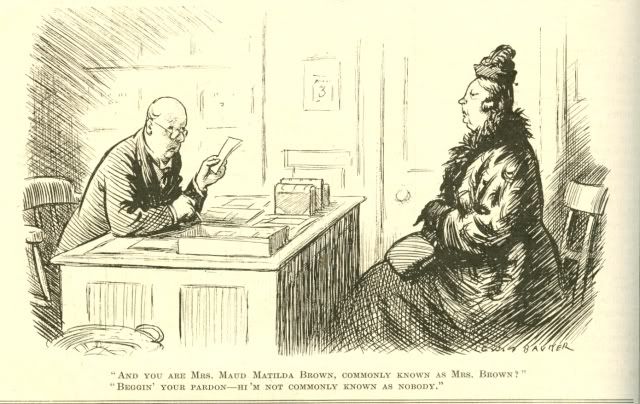
1935: Legal Jargon
The excellent ‘Plain English’ campaign is only a recent innovation. Previously various professions, in particular the lawyers, thought nothing of imposing their terminology on those who could not understand them. Mrs Brown only knows the word ‘common’ in another context and is not willing to have it used in connection with herself. She is standing on her dignity.
I wonder why the solicitor has asked her this question. Is it because she was not actually married to the Mr Brown whose estate he is settling?
I absolutely adored Punch and was very sad when it left the magazine racks. Alan Coren was my all-time hero, but I would happily read Punch from cover to cover and enjoy every sparkling sentence.
Yes, Philwhitehead, I totally agree. Sadly Punch did not survive. Its American counterpart, the New Yorker, has adopted a very successful business model attracting first class contributions and becoming an upmarket listing magazine.
My own interest is in collecting second hand volumes of Punch for particular years. I have been scanning the jokes and sharing them with other board members.
1935: What Really Concerned the Piano’s Owner
Once again George Belcher reminds us of the world outside the charmed circle of the Upper Middle Classes. The lady of the house is appalled at the damage that window cleaner would cause to her treasured possession. He has no idea what is bothering her and assumes, quite wrongly, that she is concerned for his safety.
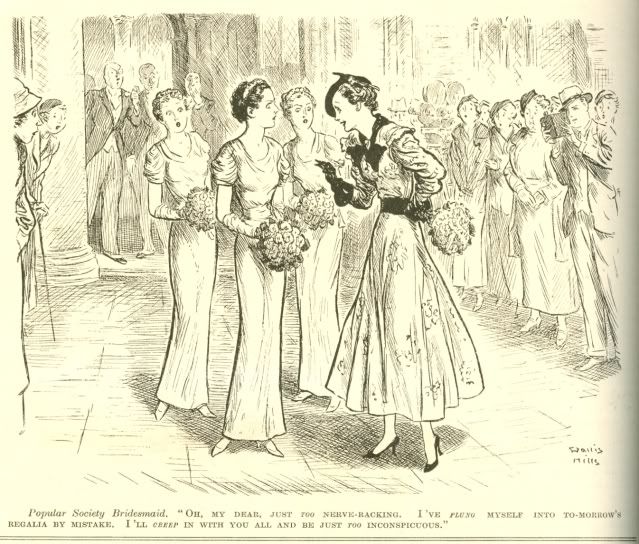
1935: Too Inconspicuous at a Society Wedding?
The upstaged bridesmaids know perfectly well that this was no mistake and that the newly arrived addition to their number invariably makes sure that she is always the centre of attention.

1935: Pernicious Advertising
Most of the people attending the Ideal Home Exhibition are full of admiration for the ideal family living in the ideal home. Right at the front of the picture we see signs of mutiny: the boy and his father who is saying ‘ugh’ represent the viewpoint of the cartoonist.
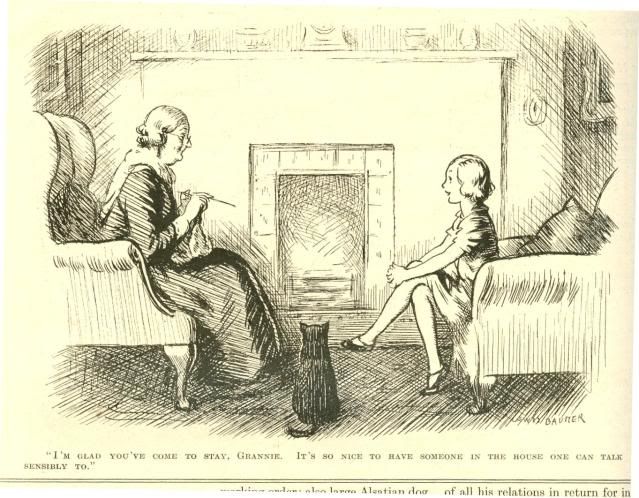
1935: Talking Sensibly
My guess is that the daughter of the house finds that her parents are forever turning conversation round to what she should be doing or thinking. Gran, on the other hand, accepts the child’s conversation at face value and isn’t trying to impose moral values.

1935: Slumming With George Belcher
Another slice of ‘real life’ including real ignorance.

1935: The Scottish Empire
This term is an exaggeration though not by much. No doubt the ship’s steward really is half-Scottish. In the days of the Empire it was populated more by the Scots than English though numerically Scotland was the smaller nation in the United Kingdom.
During my National Service in Singapore I saw this at first hand in 1954/5. With the exception of India, Burma and Ceylon the rest of the Empire was still functioning although the term Commonwealth was already preferred. During my army days I was well aware of the prevalence of the Scots both civil and military.

1935: The Right Decision
The Headmaster does not try to hide his relief that the boy’s parents realise that their son isn’t up to learning Spanish. I wonder if he was really up to any other subject?
I have wondered why the parents were keen for their boy to learn Spanish. 1935 was certainly too early for the Spanish Civil War. (Even during that war I don’t quite see such schools preparing their pupils for military service out there.)
The best theory I can up with is that the family has substantial business interests in South America and the lad is destined to join the family firm.
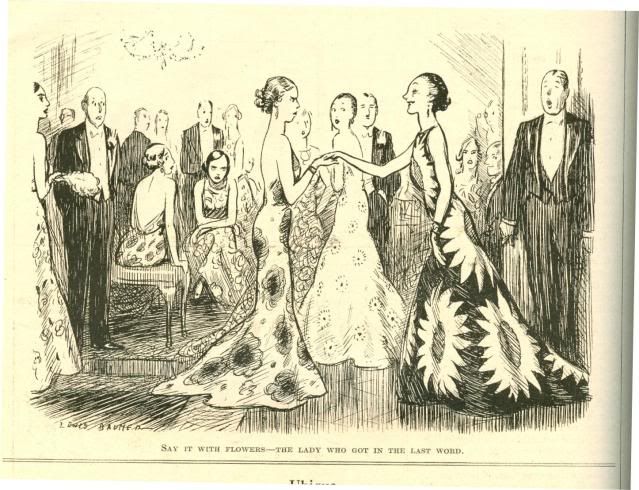
1935: Loud and Clear
She’s been upstaged and everyone knows it.
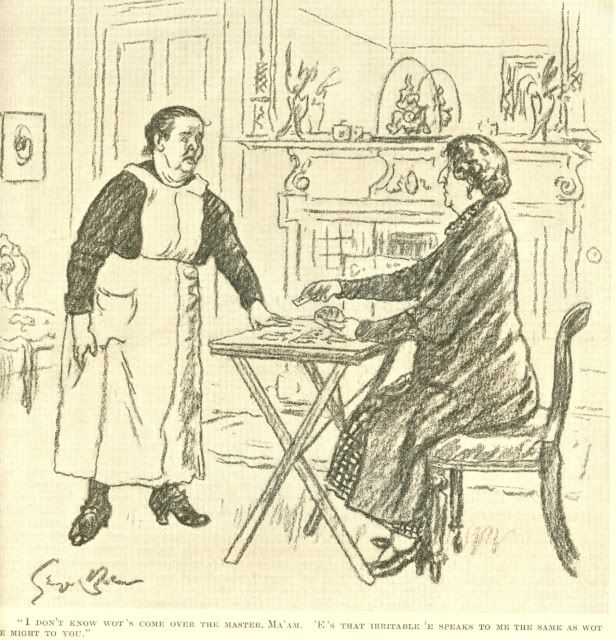
1935: The Pecking Order
What, indeed, has come over ‘the Master’? The hired help has spotted how irritable he can be when talking to his wife and can’t understand why she has seemed now to have been put in the same category.
The lady of the house is wearing a morning coat. This garment was worn when the temperature in the house was rather chilly but not cold enough to justify lighting a fire.

1935: Garrotted in the Underground
Eustace isn’t just dawdling – his neck is caught and the man on the platform hasn’t noticed, and Eustace’s wife isn’t looking either.
I doubt whether this is a plausible scenario but the cartoon allows us to see a diversity of travellers on a crowded underground carriage. Eustace and his wife are the grandest people present. Why are they travelling by underground at all? Perhaps it’s the chauffeur’s night off. They don’t seem to have been discouraged by what their fellow passengers might say to them.
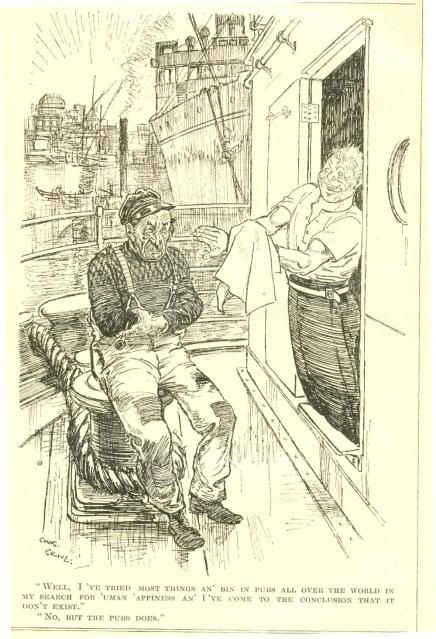
1935: Philosophy in the Merchant Navy
The younger man sees the ‘bright side of life’ (© Monty Python: Life of Brian) but the older man is the eternal pessimist.

1935: Missing the Point
The lady jockey’s mother hasn’t grasped the essential point of taking part in a race. In order to win you actually have to go fast. The jockey clearly understands exactly what is required of her.
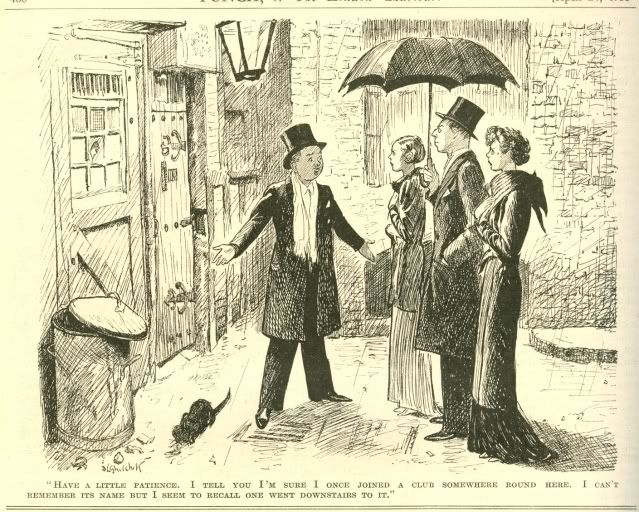
1935: Illicit Drinking Clubs
Evelyn Waugh’s novels contain various references to illicit drinking clubs which the police famously raided. The clubs were illicit in the sense that they flouted the licensing laws. The young man’s memory is not precise and his three companions are losing patience with him.

1935: The Servant Problem
The maid is behaving like a teenage daughter. Her employers are not at all pleased. I suppose the point of the joke is that they are obliged to put up with this behaviour.

1935: What Really Is Important
Another bossy upper middle class woman expects everyone to do her bidding.
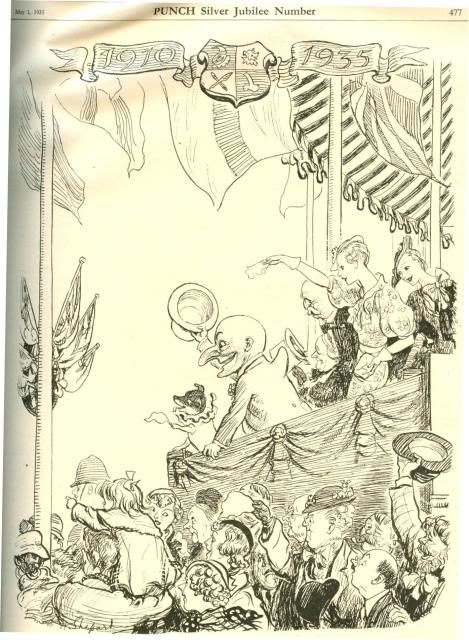
1935: They Had a Jubilee Too
We had a jubilee as recently as 2012. In 1935 there was a jubilee too. Mr. Punch was clearly in favour (and so was his dog.)
Jubilees don’t come at predictable intervals. Their occurrence depends on the age at accession and the longevity of the monarch at the time.
Edward VII and George VI never got a jubilee. The 1935 jubilee followed a gap of 37 years since Victoria’s Diamond Jubilee. George V got his by a fairly narrow margin – he died in January 1936. The current Queen’s Silver Jubilee followed a gap of 42 years from 1935.
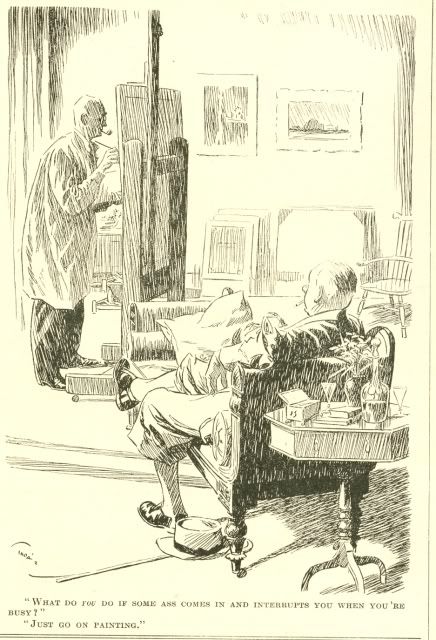
1935: An Ironic Reproof
I doubt that the current ‘some ass’ realises that this applies to him. Note the ‘plus fours’ which the sitter is wearing.

1935: Always Optimistic
She is obviously thrilled that one day he may be a real actor. There is glamour attached to even a would-be thespian.
The use of the word ‘boy’ rather than ‘boy-friend’ is unusual today. Thinking about this I have remembered reading a story set in the late 1940s in which a woman is saying that she wants everyone to know that she is a certain person’s girl. So this is not that strange.



















